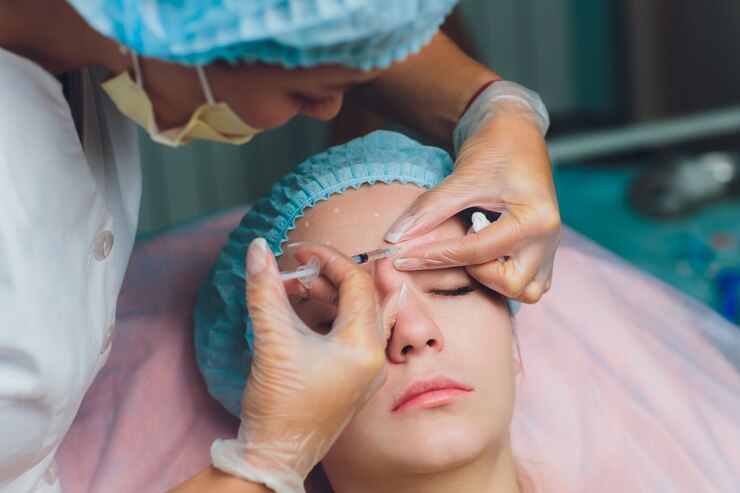Enhancing Vision, Restoring Confidence:
Oculoplastic Surgery
Oculoplastic Surgery is the branch of medicine that deals with plastic and reconstructive Surgery of the tissues adjacent to the eye, such as eyelids, faces around the eyes, orbit (eye socket), and tear ducts.Oculoplastic surgeons go through an intensive training program for both ophthalmology (eye care) and plastic surgery, specifically focusing on the delicate structures surrounding the eyeball; they work closely with specialists in ophthalmology, dermatology among others, so as to provide all-inclusive care that suits specific patient’s needs.
COMMON REASONS
Drooping Eyelids (Ptosis)
This is when an eyelid sags or has a downward appearance, which may impair vision and make the patient appear tired.
Eyebrow Ptosis
The eyebrows tend to sag, thereby giving a tired look; sometimes, this will also affect sight.
Tear Duct Blockage
Complaints include profuse tearing, recurrent eye infections and pain around the eyes due to obstruction of the lacrimal ducts.
Orbital Fractures or Trauma
Fractures of the orbital bones may necessitate reconstructive Surgery to restore normal appearance and function.
Excess Eyelid Skin
As time passes, eyelid skin tends to stretch or accumulate, producing folds or interfering with vision.
Congenital Deformities
Some congenital disabilities affecting eyelids, orbit, and tear ducts can be improved by corrective surgeries aiming at improving functioning as well as appearance.
KEY ASPECTS
Eyelid Surgery (Blepharoplasty)
This can include both cosmetic and functional procedures addressing droopy eyelids(ptosis), which may be caused by excessive skin or fat, and improving eyelid aesthetics.
Orbital Surgery
Orbital Surgery relates to conditions involving the bony cavity (orbit) housing the eye, such as tumours, fractures, and thyroid eye disease. Restoration could be required after traumatic injuries or to correct congenital deformities.
Tear Duct Surgery
Also known as dacryocystorhinostomy (DCR), this procedure is carried out to treat blocked tear ducts, which may result in tearing excessively and causing pain.
Reconstructive Surgery
After trauma, cancer removal or congenital abnormalities affecting the eyes and their surrounding structures, oculoplastic surgeons often carry out reconstructive procedures.
Cosmetic Enhancements
Oculoplastic Surgery goes beyond functionality by also enhancing facial appearances through procedures on the face and eyes aimed at correcting issues such as puffy eyes, fine lines around lips, etc.

WHY TO CHOOSE US ?
When someone chooses Jyoti Eye Hospital for oculoplastic Surgery, they will be offered professional services by trained doctors who use modern instruments, thereby improving their vision functions and aesthetics.
01.Patient Focus
Jyoti Eye Hospital emphasizes individuals and is widely known for its focus on patient-based care. This approach is significant because it ensures patients have confidence before, during, and even after surgical operations.
02.Experienced Doctors
Jyoti Eye Hospital has very experienced and well-trained oculoplastic surgeons. They handle a variety of procedures, from aesthetic eyelid surgeries to reconstructive ones aimed at improving both functionality and appearance.
03.Advanced Technology
The hospital has the most sophisticated diagnostic and surgical equipment designed for oculoplastic procedures. Thus, patients can be assured of receiving state-of-the-art treatment that guarantees the most favourable results.
04.Specialization
Jyoti Eye Hospital specializes in oculoplastic surgery, which is exclusively related to procedures for the eyes and other tissues surrounding them. This ensures the extensive experience of surgeons who have performed delicate eye surgeries.
05.Reputation & Confidence
Due to years of successful surgeries with clients who left satisfied, the hospital has maintained a reputable name in Oculoplastic Surgery; thus, many clients prefer it. Most patients choose the clinic based on referrals, or reputations from health centres.
06.All-Inclusive Care
This hospital covers the whole treatment process from beginning to end. This involves pre-surgery discussions, diagnostic tests, individualized treatment programs, and aftercare assistance to heal and attain optimal patient outcomes following Surgery.
